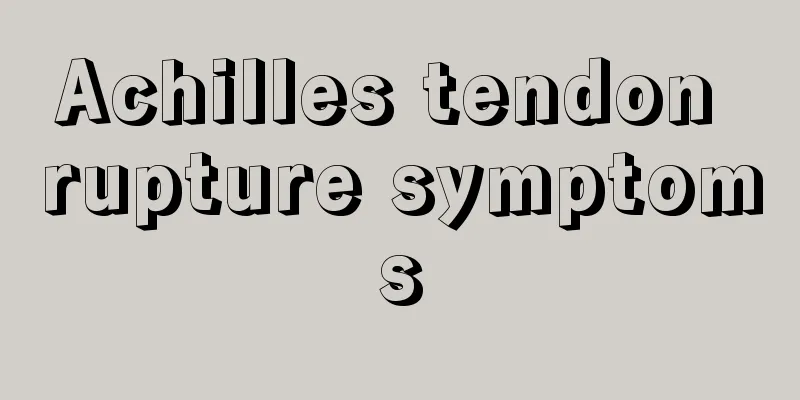Achilles tendon rupture symptoms

|
There is a hard and thick tendon at the back of the heel called the Achilles tendon. People usually use the Achilles tendon in activities such as running and long jumping. Many people who exercise a lot are prone to Achilles tendon rupture. If the Achilles tendon is torn, people will feel severe pain in the heel area. If the tear is severe, it will affect people's walking. It is best to stay in bed for a period of time to recover from a torn Achilles tendon. So, what are the symptoms of Achilles tendon rupture? There is a very thick, strong and tight tendon between the heel and the calf, which is the Achilles tendon. The Achilles tendon is about 15 cm long and is the thickest tendon in the human body. It is formed by the fusion of the tendons of the triceps surae (soleus, internal and external heads of the gastrocnemius) about 15 cm above the heel. People's walking, running and jumping rely on this strong tendon. If the Achilles tendon[2] is completely torn, it will be difficult to walk. Achilles tendon characteristics The Achilles tendon is the largest and strongest tendon in the human body. The Achilles tendon is about 15 cm long and is formed by the fusion of the tendons of the triceps surae (soleus, internal and external heads of the gastrocnemius). During this process, the Achilles tendon fibers twist 90°. The main function of the Achilles tendon is to flex the calf and plantar flex the ankle joint. It is the most important anatomical structure for transmitting calf muscle power to the foot. People can stand upright, stand firm, run and jump, all thanks to it. Symptoms and Signs The Achilles tendon does not have a true tendon sheath, but is surrounded by peritendinous tissue (fatty interstitial tissue that separates the tendon and the tendon sheath). The early pain of Achilles tendinitis is mainly caused by damage to the tissues around the tendon. When the patient gets up or continues walking, the activity of the tendon in the peritendinous tissue increases, so the pain worsens. The pain may also be worse during training. There is tenderness when pressing the Achilles tendon with fingers. If the patient continues to run despite the pain, the inflammation will spread to the tendon, causing degeneration and fibrosis, resulting in persistent pain that is aggravated by activity. Causes When running downhill, because of the long landing distance and the long acceleration distance, the stress generated by the forefoot hitting the ground is much greater than when running on flat ground. When running uphill, the gastrocnemius must work harder to lift the heel because the heel is lower than the front half of the foot. A soft heel causes the heel to move excessively within the shoe, causing instability in the hind half of the foot. The instability of the Achilles tendon insertion causes unstable Achilles tendon tension and increases the possibility of Achilles tendon tear. If the sole is too rigid, the first metatarsophalangeal joint cannot bend, placing greater strain on the Achilles tendon. Biomechanical factors for Achilles tendinitis include excessive pronation, heel strike too far, genu varum (knocked legs), hamstring and gastrocnemius stiffness, Achilles tendon hypertonia, pes cavus, and heel varus deformity. |
<<: What are the symptoms of excessive lung and stomach fire?
>>: What are the symptoms of anxiety disorder
Recommend
What's wrong with the small pimples in the anus?
In daily life, the appearance of millet-sized bum...
7 factors may cause melanoma. Recommended dietary remedies for cancer prevention
Melanoma is a common malignant tumor that often r...
How to do abdominal breathing?
The abdomen is located in the central part of the...
What to do if dumping syndrome occurs after gastric cancer surgery
Dumping syndrome refers to upper abdominal fullne...
What are the symptoms of hamartoma
As we all know, doctors judge the condition based...
The high incidence of gastric cancer is only because gastroscopy is rarely performed. If you are afraid of pain, you can choose these two types of gastroscopy. You should know the 6 major taboos
Tumors are not absolutely fatal diseases. As long...
What are some tips for eliminating triple eyelids?
Eyelids are a type of tissue that maintains the i...
Be sure to read the seven major factors of lower limb artery occlusion!
Arterial occlusion is a very common disease in da...
Can red wine be drunk cold?
Red wine is a kind of wine made from grapes. The ...
How to make vegetarian chicken and cucumber?
Vegetarian chicken with cucumber is a very common...
4 small folk remedies to treat laryngeal cancer
Patients with laryngeal cancer often experience u...
How to prevent Aconitum poisoning
Aconitum kusnezoffii is a common Chinese medicina...
What do people who often stay up late eat
It is common for people to stay up late nowadays....
What are the environmental factors that lead to colorectal cancer?
Gallbladder cancer always comes quietly, but when...
How to correctly prevent melanoma
Most people probably started to pay attention to ...









